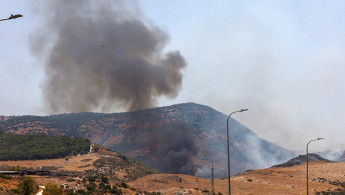Hezbollah rains rockets on Israel in response to commander killing, threatens to attack new targets
Lebanon's Hezbollah said it launched more than 200 rockets and explosive drones at Israeli military positions on Thursday, vowing to intensify its attacks after the killing of a senior commander a day earlier. as tensions have soared amid the almost nine-months-old war raging in Gaza.
The Iran-backed militant group said its latest attack, which followed the launch of over 100 rockets on Wednesday, came in response to Israel's killing of a senior Hezbollah commander, Mohammed Naameh Nasser, near the southern Lebanese coastal city of Tyre.
A source close to the group described him as the "Hezbollah commander responsible for one of three sectors in south Lebanon." Another border sector chief was killed in an Israeli strike last month.
The Israeli military said Thursday its forces were "striking launch posts in southern Lebanon" after "numerous projectiles and suspicious aerial targets crossed from Lebanon into Israeli territory".
It said that most were intercepted by air defence systems but that "fires broke out in a number of areas in northern Israel" following the attacks.
Israel did not report any deaths in its northern border area, where most communities have been evacuated, but quickly said it had responded with strikes on targets in southern Lebanon.
Hezbollah said that "as part of the response to the... assassination carried out by the enemy" it had fired "more than 200 rockets" and "a squadron of explosive drones" at Israeli bases.
Air raid sirens blared across northern Israel in the morning, and an AFP correspondent witnessed rockets crossing the frontier that were intercepted.
Senior Hezbollah official Hashem Safieddine threatened to attack new locations within Israel as part of the group's response to the killing of Nasser.
"The series of responses continues in succession, and this series will continue to target new sites that the enemy did not imagine would be hit," Safieddine said, speaking at the senior commander's memorial on Thursday.
Israel and Hezbollah, an ally of Palestinian group Hamas, have exchanged near daily cross-border fire since the Gaza war erupted on October 7, stoking fears the clashes could escalate into all-out war.
UN chief Antonio Guterres is "very worried about the escalation of the exchange of fire", his spokesman Stephane Dujarric said Wednesday, warning of the risk to the wider Middle East "if we were to find ourselves in a full-fledged conflict".
Hezbollah and Hamas are part of an Iran-led "Axis of Resistance" against Israel and the United States, a regional alliance that also includes Yemen's Houthi rebels and militias in Iraq and Syria.





 Follow the Middle East's top stories in English at The New Arab on Google News
Follow the Middle East's top stories in English at The New Arab on Google News


